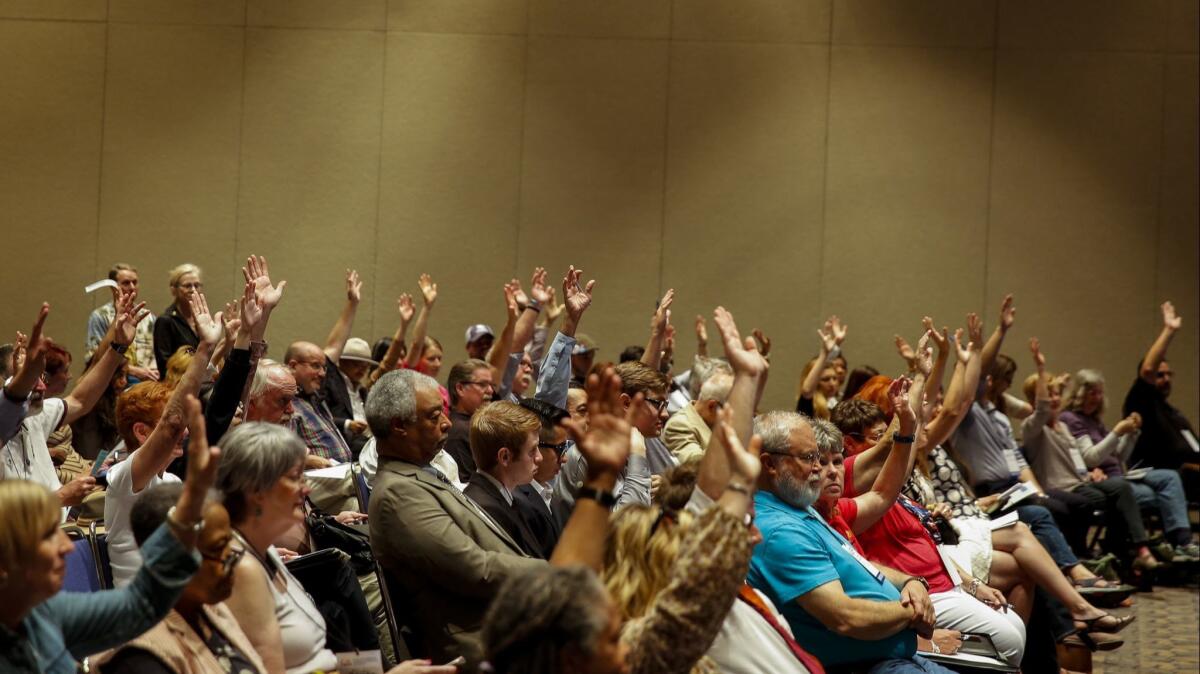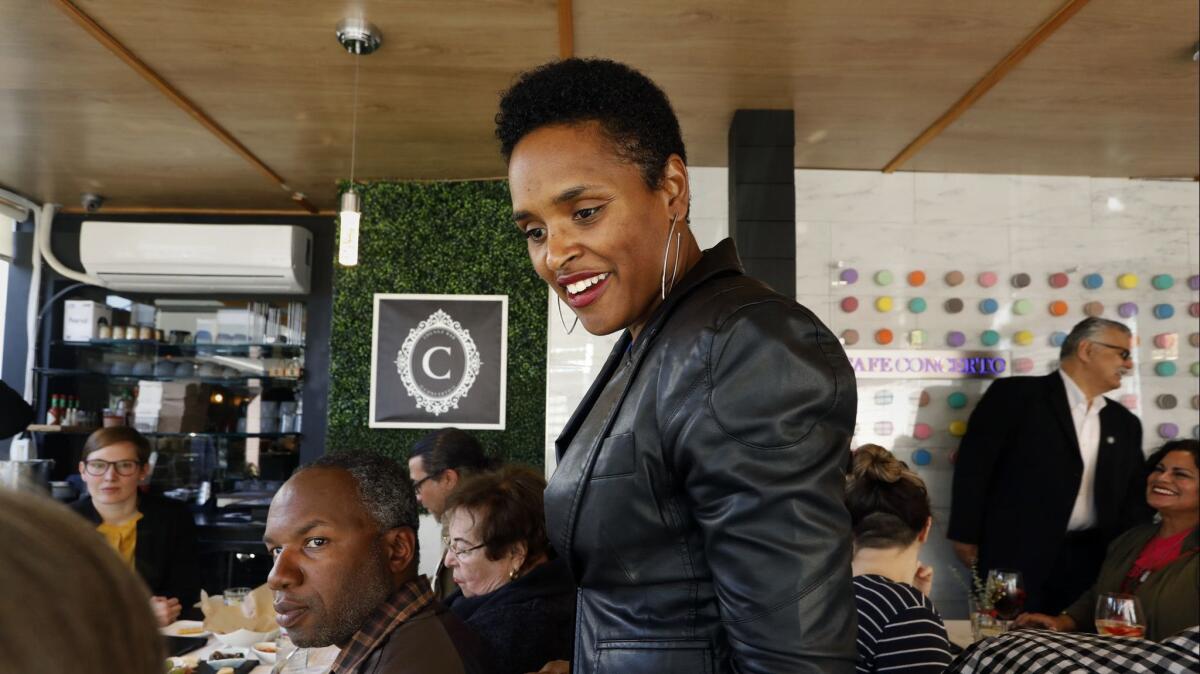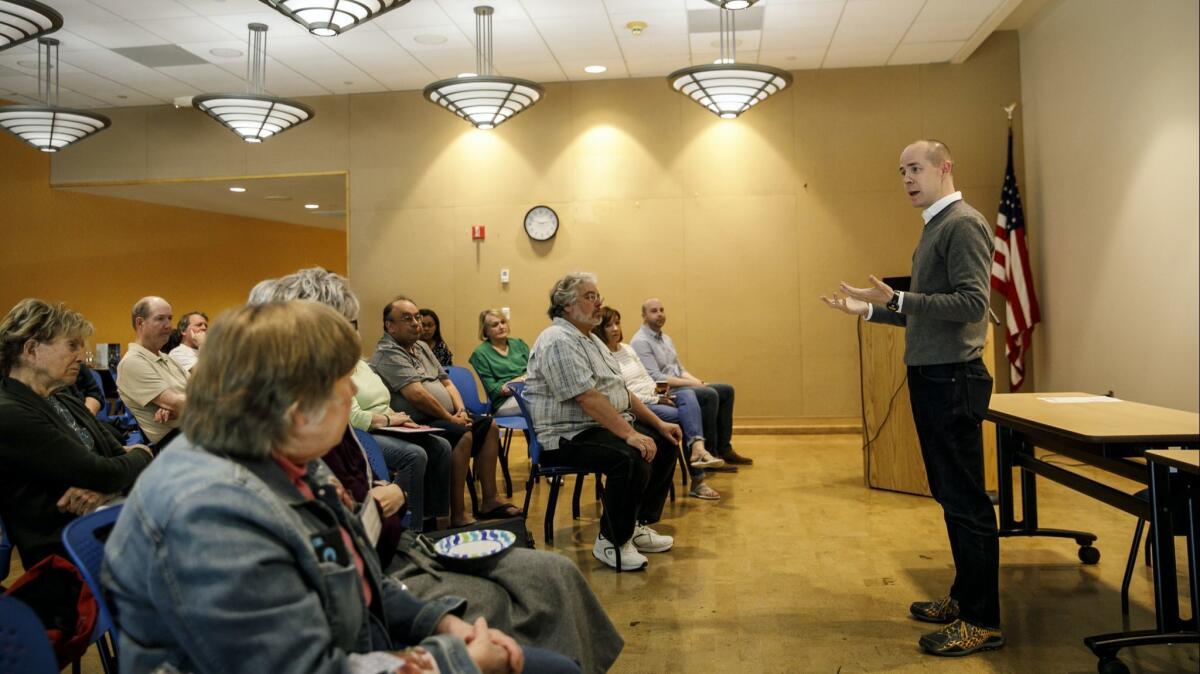California Democratic Party to pick a new leader after a year of tumult

- Share via
Reporting from SAN FRANCISCO — More than a dozen presidential hopefuls and their supporters will descend on San Francisco this weekend as the California Democratic Party meets for its first statewide convention of the 2020 campaign.
But for many party activists, the focus of the convention will be on another race closer to home. Months after the resignation of party Chairman Eric Bauman following sexual misconduct allegations, delegates will choose a new state leader who will be tasked with rehabilitating the organization’s internal culture, preparing Democrats for California’s March presidential primary and defending more than a dozen newly flipped congressional and legislative seats next year.
There is little daylight between the positions of the race’s three front-runners on many key issues for the Democratic Party. Bay Area activist Kimberly Ellis, Los Angeles County Federation of Labor President Rusty Hicks and state party Vice Chairman Daraka Larimore-Hall have each expressed support for “Medicare for all” and the Green New Deal. Other candidates include attorney Lenore Albert, privacy activist Mike Katz-Lacabe, retired college professor Rita Ramirez and businessman Mike Saifie.
Instead, the race has revolved around how best to reinvigorate a fractious base and whether activists should push elected officials in this Democrat-dominated state even further left.
“A lot of people look at the chair’s race and they think it’s the battle for the heart and soul of the California Democratic Party,” said Robin Swanson, a Democratic consultant who was previously a spokeswoman for the state party. “The truth is it’s a fight for the party structure, and that’s because the party serves as the ultimate fundraiser.”
California Democrats didn’t expect to vote for a new leader so soon. Just two years ago, Bauman was elected chairman in a divisive race that exposed the rift between party insiders and the more progressive wing of the party. Ellis, who was buoyed by activists who had supported Sen. Bernie Sanders’ 2016 presidential campaign, lost by a few dozen votes and contested the results for months.
Bauman, who had enjoyed the support of major labor groups and the state’s top Democratic elected officials, resigned in November amid allegations of misconduct. The party now faces at least three lawsuits claiming workplace harassment, discrimination and retaliation, and accusations that other top leaders turned a blind eye to the allegations.
The scandal prompted a calls for culture change and invited discussions about how activists might better organize and wield their power.
Delegates will consider a resolution from Christine Pelosi, chair of the party’s Women’s Caucus, that proposes requiring mandatory bias and harassment training for delegates and consultants and guidelines for power-sharing based on the results of the chair’s race. Others have called for reducing the chair’s powers and making it easier for the party to suspend its leader pending the outcome of an investigation.
But while much of the attention in the race has been on addressing party culture, doubling down on progressive ideals and the potential impact of such an ideological shift on the party’s finances have been another central focus of the campaign.

Ellis has discussed “redefining what it means to be a Democrat” and said she wants to push a bold policy agenda to help the party capture some of the grass-roots energy and money that flowed to groups such as Indivisible and Swing Left after the 2016 election. She has received support from young delegates and groups including the Sanders-affiliated Our Revolution and has promised that half of her administration would be made up of women or people of color.
Hicks, who has the backing of many elected officials and most major labor organizations in the state, has touted his work to diversify the board of the L.A. County Federation of Labor, one of the most powerful labor organizations in Southern California and a frequent ally to Democratic candidates. He has said he would focus on how to help win back the White House and keep key legislative seats.
Larimore-Hall, who chaired the Santa Barbara County Democratic Party for years, has emphasized his background as a local activist and organizer, pitching a shift toward making the party an “advocacy organization” to drive political debate in the state between elections. He has received support from many of the party’s clubs and local groups.
At a candidates forum in Northern California last month, Ellis accused some state legislators in her party of obstructing movement on key progressive policy priorities, while Larimore-Hall said the party should harness its grass-roots to make it “very painful and expensive” for officeholders who vote against those goals.
“It is incumbent on the chair of this party to hold our elected officials accountable to our platform to move forward in a bold and aggressive way,” Ellis said.
All three front-runners have vowed to enforce the organization’s ban on political contributions from oil and tobacco companies, corporate interests the party has deemed incongruous with its platform.

But Ellis’ support of publicly financed elections have left some wondering whether she would further limit corporate donors or ban them altogether, a move that could hobble the party financially.
Ellis often speaks out against money in politics and has said that “not one penny” of her campaign funds has come from corporate contributions — evidence, she says, that there are Democratic donors willing to invest in the party as long as it reflects their values.
Meanwhile, Hicks has said the party “should have a conversation” about what kinds of money to accept but cautioned against moving too quickly.
“What we are talking about is the lifeblood of the party, the ability to communicate with 9 million Democrats and build a program that we need,” Hicks said at the Northern California forum. “If we want to say that we’re the party that’s solely funded by small-dollar contributions, that takes an infrastructure investment to make that happen, and it doesn’t happen overnight.”

Ellis has called such fears unfounded, noting that she has proposed adding new streams of revenue from small donors, not taking others away.
“We say that we support campaign finance reform,” she said in an interview. “I think it’s a fair question for us to ask, what are we doing as a state party to advance that value? …That’s not trying to burn the house down.”
After Ellis’ last campaign, lawmakers in both houses of the Legislature tried to push through a measure that would have dramatically increased campaign contribution limits for legislative leaders of both parties, a move one official said at the time was akin to legislative leaders “filing divorce papers” from the state party.
The effort sparked an outcry from party activists including Larimore-Hall and Ellis, who complained on Twitter of “[Democrats in Name Only] in our midst” controlled by “corporate masters” and threatened primary challenges if legislators were “arrogant” enough to pass the bill, which later failed.
Assembly Speaker Anthony Rendon of Lakewood and state Senate President Pro Tem Toni Atkins of San Diego have so far declined to endorse in the race, as has Gov. Gavin Newsom.
“I think that elected leaders have a right to be nervous [about the race for chair] because this is a critical relationship for keeping their members in office,” Swanson said. “There has to be trust there.”
The challenge, Swanson said, is that legislative leaders must think about how to reelect members in places such as Orange County or the Central Valley, where voters’ values might not align with the policy agenda of left-leaning party activists.
“The reality is that ideological purity and purity on the fundraising end is very expensive,” said Darry Sragow, who was the chief strategist for Assembly Democrats for nearly a decade. “The reason that the system is constructed the way it is is because that’s what it takes to win.”
The party’s next leader would be wise to carefully consider how much influence he or she should try to wield over elected officials and their campaign cash, Sragow said.
“The party is an important vehicle, but if the party becomes an ineffective vehicle for campaign efforts, the legislative leadership will find another way to do it,” he said, noting that party members could instead raise money for political action committees or use independent expenditures that can’t coordinate directly with candidates.
For more on California politics, follow @cmaiduc.
More to Read
Get the L.A. Times Politics newsletter
Deeply reported insights into legislation, politics and policy from Sacramento, Washington and beyond. In your inbox twice per week.
You may occasionally receive promotional content from the Los Angeles Times.










